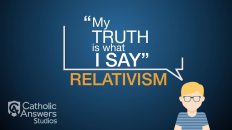Oxford Dictionaries’ designation of “post-truth” as the word of the year in 2016, related to the election of Donald Trump in America, Brexit in the UK, and other similar political events in the West, was not merely indicative of a phenomenon unique to that year but a reality still very much present today. However, the current President and administration are not the source but rather a symptom of this cultural shift, a change that will continue to progress long into the future. As those who are called to bear witness to truth, we must consider this impact beyond just the next few years.
Post-Truth Culture
While the caricature of a lying politician is nothing new, British journalist Matthew d’Ancona, in his book Post-Truth: The New War on Truth and How to Fight Back, highlights the ways in which this societal shift to “post-truth” is different. Whereas before dishonest politicians were criticized and looked down upon for not telling the truth, the onset of politicians and pundits who now unashamedly fabricate the truth and blatantly falsify statistics in full view of the public eye with virtually nothing and no one able to call them to account is new.
Perhaps of greater importance, though, is that this type of activity appeals to a broad base of Americans who have been swept up in the baseless claims of false narratives, some of which d’Ancona mentions, including: that vaccinations cause autism, that police brutality against people of color is a myth, that the climate crisis is a farce, to name but a few. Despite the overwhelming scientific evidence and statistical studies that run contrary to each of these claims (and others not listed here), many continue to espouse these views because it feels right and resonates with a personal experience that has otherwise gone unexplained (or not explained to their liking).
The Church in Post-Truth America
While the undoing of “truth” as defined by modernity may frighten many Christians and church leaders, if understood correctly and traversed with humility, integrity, and a willingness to revisit where we have placed the foundations of our faith, a new (old) way can emerge for the truth of Christ to be made known in the third millennium, even in a so-called “post-truth” society.
What, then, does this “post-truth” society mean for the church, a community whose mission and existence rests upon claims to the truth?
First and foremost, Christians must be champions of truth in every regard. When we are duped by conspiracy theories, fake news, unscientific reports, and the like, when we brush aside the testimonies of #MeToo and #ChurchToo to protect religious leaders we have long admired and hold dear, when we claim that racial injustice ended long ago and care more about respecting a flag and a song than we do the ideals for which they stand and the people they represent, we compromise our witness in the world. If we can’t face the facts or listen to the testimonies of others or believe victims, who will believe us when we bear witness to the truth? We might rephrase Martin Luther King Jr.’s axiom on injustice to instead say: A disregard for truth anywhere is a threat to truth everywhere.
PRESS CTRL+F4 to return to Manje Pou Nanm after reading the article.








